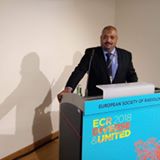Abstract
Background: Radiofrequency ablation is an important
and ideal treatment for hepatocellular carcinoma. However;
subcapsular HCC carcinoma need special care to be treated
by radiofrequency ablation.
Objective: To evaluate the safety and effectiveness of
percutaneous radiofrequency ablation (RFA) of subcapsular
hepatocellular carcinoma (HCC).
Patients and Methods: We performed a retrospective
analysis of 50 patients who underwent percutaneous ultrasound-guided
RFA for treatment of HCC in Sohag University
Hospital from May 2008 to April 2014. All lesions are subcapsular
HCC (less than one cm from the capsule). All patients
underwent contrast enhanced computed tomography imaging
of the liver during follow-up and the treatment effectiveness
and safety were evaluated. Incomplete ablation, recurrence,
complications, and mortality were reported.
Results: Complete ablation was achieved in 45 out 50
patients. Four patients were referred to chemo-embolization
treatment. The 5 thpatient was lost to follow-up. Five major
complications occurred in our series, namely sub-capsular
hematoma (in 2 patients), pleural effusion (in 2 patients),
transient ascites (in 1 patient), portal vein branch thrombosis
(in 1 patient) and needle track tumour seeding (in 1 patient).
No death was reported in our study.
Conclusion: Subcapsular HCC carcinoma can be treated
safely and effectively by RFA using cautious techniques by
experienced operators to prevent complications.

